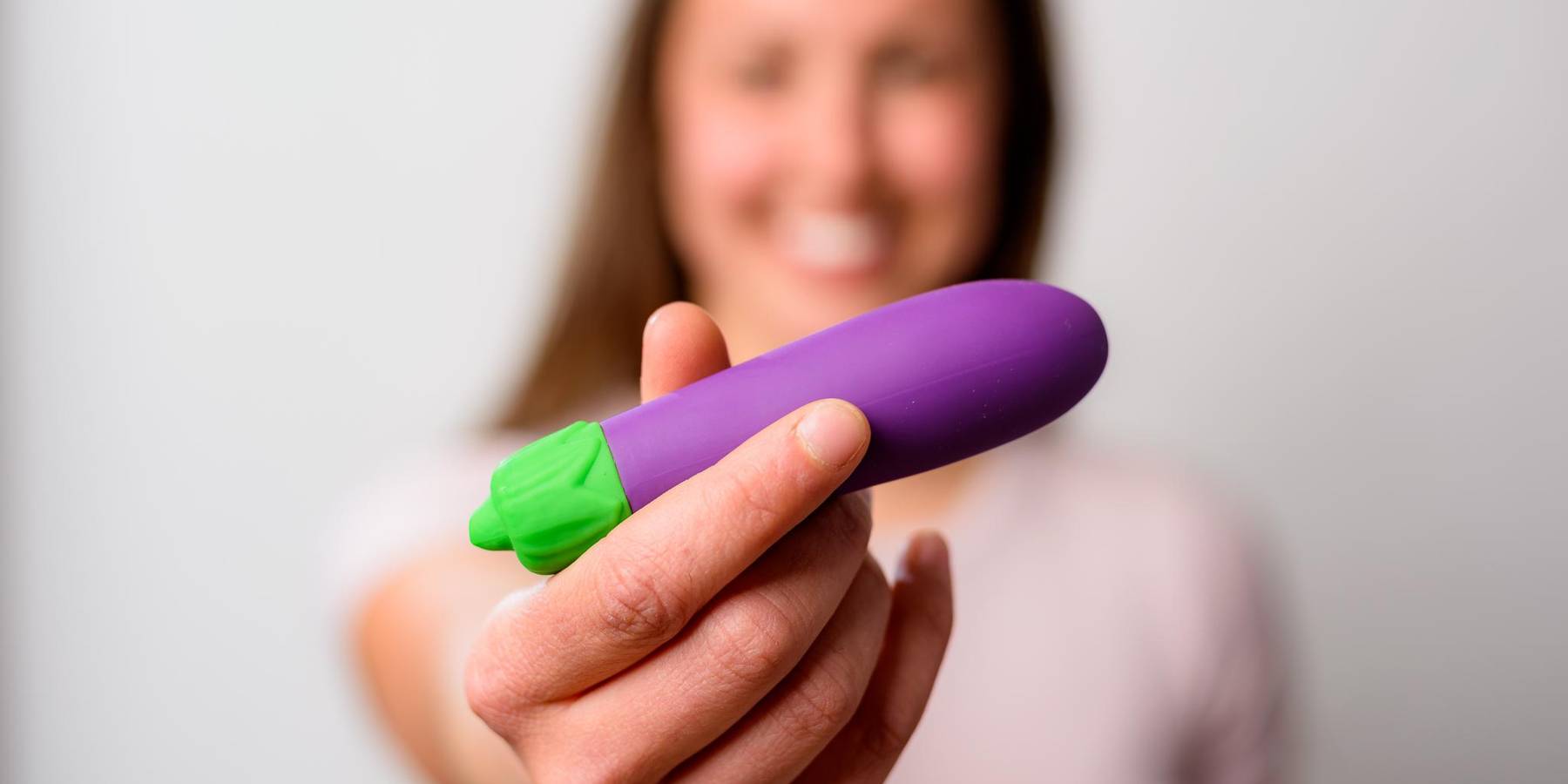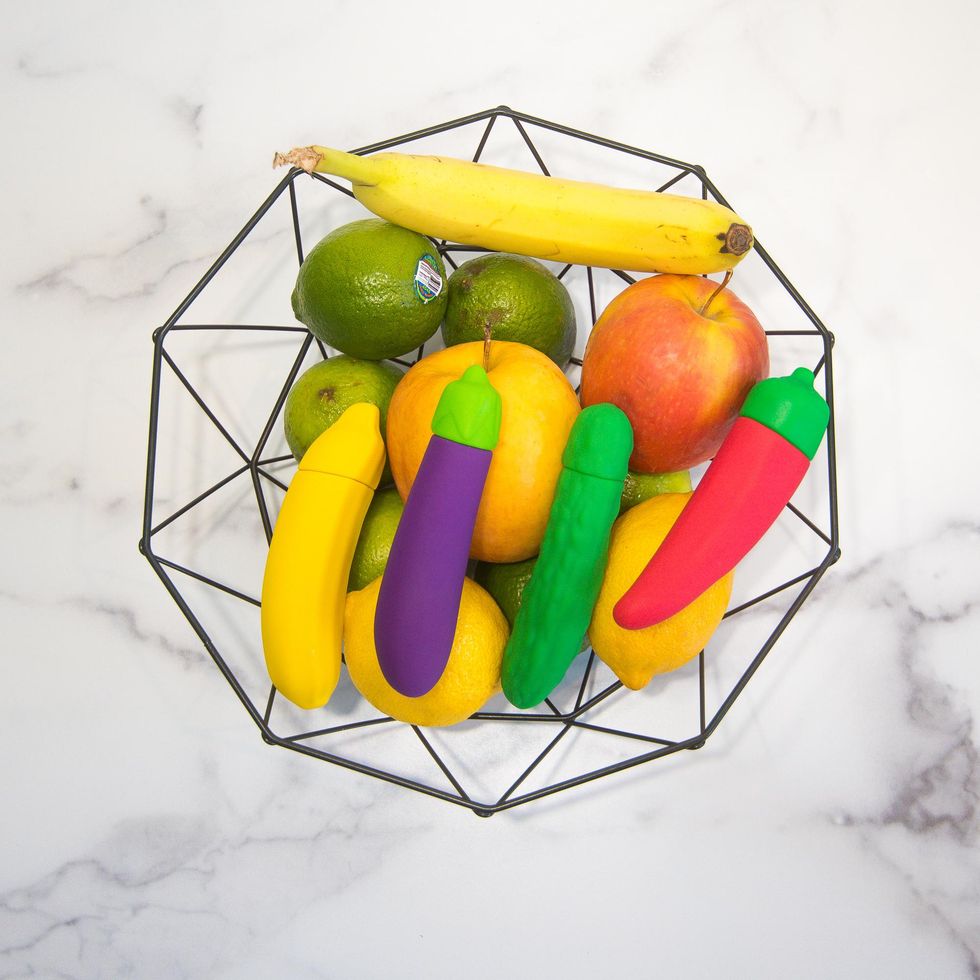
Anyone who’s ever been to a sex store or a Spencer’s knows that there’s a horny side of human ingenuity, especially when there’s some dirty humor involved. However, an endless number of penis-shaped straws and pussy lollipops have also proven that the novelty sex toy industry has only been coming out with slight variations on the same one-dimensional gag gifts for years. Of course, there’s nothing particularly wrong with that, seeing as how dick bongs will forever be a necessity for frat boys and bachelorette parties alike.
Even so, one company in this sphere is still rethinking where exactly their products fit into the ever-evolving sociocultural conversations surrounding sex and sexuality, and its name is Emojibator.
While the company may be best known for their viral eggplant emoji vibrator, co-founders Joe Vela and Kristin Fretz have also continually participated in the wider discourse pertaining to things like clear consent and sexual assault by tackling these complex topics through innovation and creative partnerships, including the provision of educational resources and a recent push to send 1,000 eggplant vibrators to anti-abortionists and Texans to protest the state’s controversial heartbeat bill.

Kristin Fretz and Joe Vela (Photo courtesy of Mike Ryan)
After all, Vela said the duo was influenced by feminist movements like #MeToo rising to prominence around the time of Emojibator’s 2016 founding, something that made them want to keep incorporating these values into new products and initiatives. For example: the idea that women can reclaim their sexual power by advocating for their orgasms, which Fretz said they addressed by framing Emojibator as a “more accessible” toy for those on a limited budget and/or women affected by the lingering stigma of female pleasure.
"There is an audience of consumers who don't want to spend more than $100 to try out something that maybe they've only heard about or seen in movies. Or they may not feel comfortable talking about it," she said. "But we find that our emoji-inspired designs and their bright colors make you feel like there's no shame in liking [sex, pleasure and masturbation]."
"Because something that looks like an eggplant can be too silly to allow that shame or embarrassment to trickle in," Fretz continued, before Vela added that Emojibator has "a really big audience of people who don't want the big fleshy vibrator that you find in a lot of places."
They soon realized that they also "had an opportunity to help survivors of trauma, who may be people that, again, don’t want that fleshy toy,” according to Vela, because they feel safer with "something really approachable, fun and colorful."

So with that in mind, Emojibator recently partnered up with sensual reclamation coach and activist Marlee Liss to amplify the discussion surrounding trauma-informed pleasure for sexual assault survivors and show how their toys can help assault survivors heal from trauma and reclaim their sexual power.
"A lot of survivors were really shocked and delighted to see that a company was making non-phallic toys that were purposefully playful in the design and... pretty humorous," Fretz said. “It's hard to not crack a smile when you're looking at the shape of our toys, and I think that's just such a non-traditional emotion to feel when someone says the word 'vibrator' or 'dildo.'"
Similarly, Liss echoed Vela and Fretz’s statements by saying the reason she loves Emojibator is because of its "lighthearted, fun-loving approach to sexuality," adding that as a trauma survivor, she knows "how important it is to build associations between sexuality and joy."
Fretz went on reiterate the importance of making an affordable product, especially as the rest of the sex toy market focuses on expensive technological innovation. "It’s not just about having the biggest, strongest vibration that will cost you $300," she said.

"The high tech sector tech narrative is too limiting. A lot of that stuff is for people who have a lot of disposable income and are maybe more vocal about being sex positive,” she said, before Vela chimed in that they’d "rather be the Honda or Jeep of sex toys than Tesla or BMW."
He continued, "We want to be for everyone and we definitely don't take ourselves too seriously. We were just trying to do something that's really fun, while also making high-quality toys. Maybe we don't have the latest technology or use AI to determine some of this stuff, but I also think that's a limited way of thinking about sexuality."
Additionally, Vela said he believed that a lot of high-end and technologically advanced companies seem less focused on the "education side" of things, including topics related to sexual, mental and emotional health, adding that these things were "more important to us than creating a product that tracks your biometrics."
"Because we’re really just trying to compete with a society that doesn't want to celebrate female pleasure in the way they celebrate men's," Fretz said, before suggesting that the tech is far less important than working to promote female orgasms and fighting the stigma surrounding it.
She added, "And so that’s why we’re working our hardest to create memorable toys. The kind that you want to tell your friends about."
Welcome to "Sex with Sandra," a column by Sandra Song about the ever-changing face of sexuality. Whether it be spotlight features on sex work activists, deep dives into hyper-niche fetishes, or overviews on current legislation and policy, "Sex with Sandra" is dedicated to examining some of the biggest sex-related discussions happening on the Internet right now.
Photos courtesy of Emojibator
Related Articles Around the Web